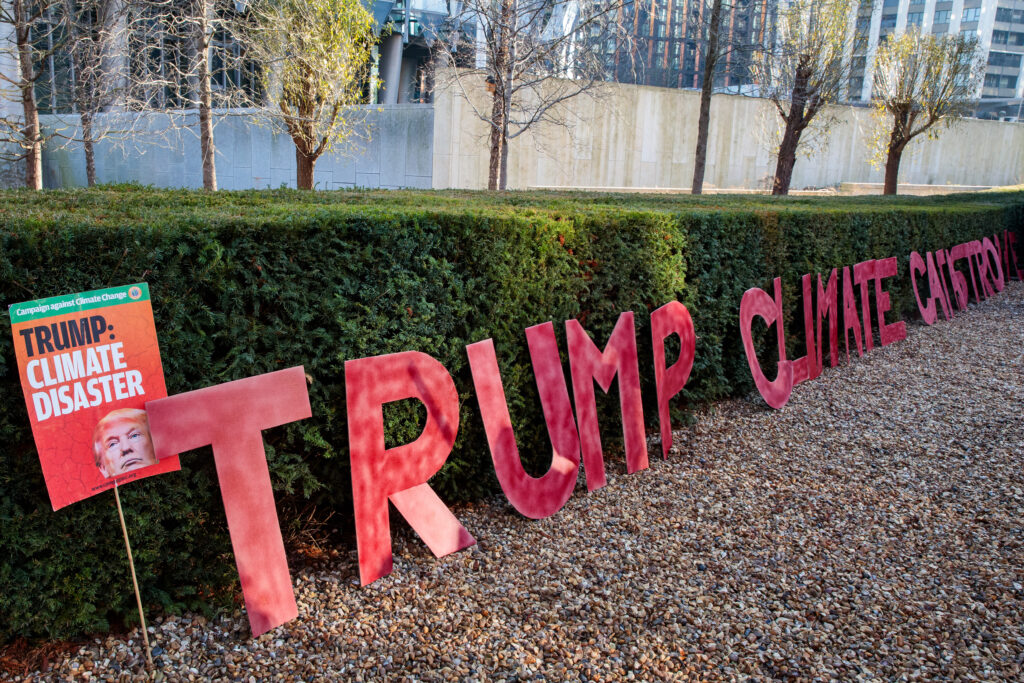Interviews / Climate, Environment, Security
25 March 2025
The attacks of the Trump II administration on climate, the environment, and biodiversity

As the climate emergency intensifies, the new American administration, under Donald Trump’s climate-sceptic leadership, is executing a harsh withdrawal from the country’s climate and environmental commitments. Characterised by a weakening of research funding, this reversal has provoked an outcry from the scientific community, which has voiced its discontent through protests such as “Stand Up for Science” on 7 March. How far does the United States’ disengagement on these issues go? What is the impact on climate science? And what consequences will this have for international cooperation on the environment and climate change? An update with Eléonore Duffau, researcher at IRIS within the Climate, Environment and Security programme.
How Are Donald Trump and His Administration Threatening Climate Science?
Since his return to the White House in January 2025, Donald Trump has waged a direct, meticulous and organised campaign against research and science. Universities and researchers producing knowledge in the humanities, social sciences and natural sciences are facing multifaceted attacks (loss of funding, censorship, threats, dismissals, etc.) that are extremely concerning for academic freedom and independent research. Climate science, environmental protection and the fight against climate change are particularly targeted by the Trump administration, which threatens both the progress made in the United States and international scientific and political cooperation on these issues. While 2024 was the hottest year on record, with global average temperatures 1.55°C above pre-industrial levels, this slowdown in climate action is alarming. The United States is a key actor in the development of climate science, which is crucial for understanding the effects of climate change on our societies and for devising appropriate solutions. Since 2020, 23% of scientific studies on climate change have involved at least one US-based scientist (compared to 5% for France). Half of the global ocean observation network also relies on American equipment. The removal of climate change sections from government websites and the banning of certain terms related to the environment, climate or clean energy from academic publications—under threat of losing funding—are significant obstacles to the production and dissemination of knowledge in the US and around the world.
What Measures Has the Trump Administration Taken Nationally to Undermine Climate Action and Environmental Protection?
Budget and staff cuts under the Trump administration have already impacted several US agencies dedicated to climate and the environment. The US National Oceanic and Atmospheric Administration (NOAA), which plays a key role in climate, weather, and marine resource research worldwide, was one of the first targets of these attacks. Some 1,300 employees have already left the agency, weakening weather forecasting—including hurricane tracking—and jeopardising the development of next-generation climate models, early warning disaster systems, nautical mapping, fishery sustainability, and more. The Federal Emergency Management Agency (FEMA) has also laid off around 1,000 staff, which could threaten Americans’ safety during extreme weather events. The new director of the Environmental Protection Agency (EPA), Lee Zeldin, has announced a 65% budget cut for the agency, leading to a massive wave of dismissals. Services dedicated to environmental justice—which for decades have fought pollution affecting disadvantaged communities in the US—have been shut down. The administration is methodically dismantling, or planning to dismantle, many of the core environmental regulations that form the basis of the EPA’s mandate. These regulations limit pollution from vehicles, coal-fired power plants, oil and gas operations, chemical pollution of waterways and land, and greenhouse gas emissions. All of these laws protecting the environment and public health could be scrapped, removing all environmental constraints on fossil fuel and polluting industries. In line with this, the government has announced a rollback of corporate climate transparency requirements.
In the energy sector, Donald Trump has reaffirmed his commitment to fossil fuels by accelerating the exploitation of US energy resources and halting the transition initiated by Joe Biden. He has declared an “energy national emergency” and announced the easing of environmental regulations for fossil fuel and mineral resource extraction. Federal agencies are also instructed to speed up permit approvals and promote liquefied natural gas exports, supporting the growth of US fossil industries and rewarding the financial backers of his presidential campaign. The administration has also frozen approvals for any new renewable energy projects on public lands in the US and halted the approval of new wind power projects. Moreover, Trump has withdrawn financial support for renewable energy projects abroad and ended federal subsidies for electric vehicles, which had been introduced under Joe Biden’s Green New Deal.
Is International Cooperation on the Environment and Climate Change Affected by These Attacks?
Unsurprisingly, the administration has once again pulled the United States out of the Paris Agreement, as was done during Donald Trump’s first term, with the official withdrawal expected in January 2026. The Paris Agreement is the main international tool for combating climate change, and this withdrawal jeopardises both the country’s own climate goals (the US being the world’s second-largest polluter and historically the largest) and global efforts to curb global warming. To stay below a 2°C increase in average global temperature, Joe Biden had pledged to reduce US greenhouse gas emissions by more than 60% by 2035 (compared to 2005 levels) and to reach carbon neutrality by 2050. This withdrawal and Trump’s national policy reversal would severely hinder those commitments.
In addition, NASA’s chief scientist Katherine Calvin, co-chair of IPCC Working Group 3 on emission reduction solutions, was barred from attending the last IPCC meeting in China in late February to vote on the timetable for upcoming reports. She was subsequently dismissed in early March. NASA also terminated the contract of the team supporting her work, placing the entire effort at risk. As a result, the IPCC timetable could not be approved, delaying the collection of scientific climate data and thereby slowing global efforts to mitigate the effects of climate change.
US disengagement is also evident in reduced climate financing: the $4 billion contribution to the UN Green Climate Fund, which supports adaptation in developing countries, has been cancelled. USAID, the US agency for development aid—also being dismantled—contributed $3 billion to climate finance in 2024. Climate cooperation and information-sharing programmes are also being impacted. The administration has announced the end of global air quality data sharing, previously gathered by US embassies and consulates, threatening vital pollution monitoring and public health improvement efforts. It has also halted a drought early warning system for Africa. Another example: NOAA scientists are now prohibited from communicating with France’s research institute IFREMER on North Atlantic studies. If ties are completely severed, France will lose access to data collected by the 4,000 autonomous floats deployed across the seas under a programme monitoring ocean temperature and salinity. These announcements have shaken the scientific community and climate action stakeholders, marking a clear step backwards in all areas of environmental and climate protection and directly endangering human health and safety in the US and worldwide. US courts may strike down some of these executive orders once enacted, but time is of the essence—every tenth of a degree of warming brings dramatic consequences for the climate, and greenhouse gas emissions must be drastically reduced if we are to stay below the 2°C threshold.

